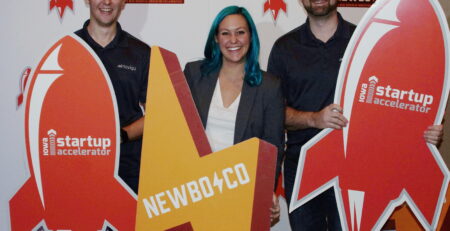The Road to $9.5M: Tips from the Recent Equity Round of Neocova
Neocova is disrupting the banking space, one piece of tech at a time. And investors are taking note: The St. Louis-based startup just landed $9.5 million in its Series A funding round.
Neocova offers cloud-native, AI-based solutions designed specifically to support community banks and credit unions. The company’s mission: help out the small guy, those community banks that have been paying astronomical contract fees for outdated core programming.
With 20 years in business and as a researcher under his belt, co-founder and CEO Sultan Meghji set out in 2015 to found Neocova and started offering solutions to those three key problems:
-
The tech used in banking was severely outdated, and the market was dominated by three major players.
-
The business models and pay structures for services that other companies were using were outdated and trapped banks in contracts for old tech.
-
The smaller banks were under immense amounts of pressure from all sides of the banking ecosystem and weren’t getting the help and tech they need to get the job done.
LIke so many entrepreneurs, he bootstrapped Neocova in the beginning, but using an effective fundraising strategy and human-first culture, his team successfully raised over $9.5 million in its Series A, announced in January 2020
That certainly piqued our interest, so we caught up with Sultan and asked him a few questions about Neocova, his best practices for locking down investments and more.
MOSourceLink: When people think of banking or startups or equity investment, they often think of the coasts. Why the Midwest? Why St. Louis?
Sultan Meghji: We chose to be headquartered in St. Louis on purpose. There is a wonderfully strong banking community here in Missouri and also next door in Illinois and Kansas. And for us, we see the value community banks have in terms of driving local economic growth. We feel very powerfully that that’s something that should be preserved and given every opportunity to thrive, it’s really a part of our mission at Neocova.
What makes Missouri and smaller banking communities so important to you?
I was born in a small town in Illinois, and my grandparents were from an even smaller town called Neumann, Illinois. It used to have a bank and it doesn’t anymore. It used to have a main street, and now it doesn’t even have a gas station. However, it’s only a 25-minute drive from one of the fastest growing cities in the Midwest: Champaign, Illinois.
When you take away the local community bank, you remove one of the main drivers of economic activity.
And so, yes, I care greatly about keeping Missouri dollars in Missouri: It’s a core piece of our value proposition.
You took a different approach to raising your Series A. Can you walk us through what you did differently and why it worked?
It was my checkbook personally that was driving Neocova and by the time we left stealth mode, we were halfway into our round. I think that’s important to note.
Then with this round, we were really quite fortunate because all of our investors are strategic partners. We didn’t take any venture capital. We already had an MVP.
We raised strategic capital from community banks, which nobody had really done before for a tech company. We made a conscious effort to do that since we work inside of the banking ecosystem. And we did it in a way that looks a lot more like a community bank getting launched than a tech company getting launched.
From our perspective, our investors are all our partners. Every single one of them is a strategic player in the space that we work closely with on a daily basis, and that enhances our value proposition to them. It allows us to be entirely strategic in terms of our viewpoint and what we’re doing in this market because our shareholders are directly aligned with that as well.
What are some tips you have for entrepreneurs and business owners that are trying to raise capital?
There’s the science to it: you have to have a business model and financial model that make sense in your market.
But there’s also an art to it: you have to know how to communicate with your constituency. Our community bank leaders are some of the best bankers in the world. So when I pitched Neocova I had to talk to a banker like a banker. When we are part of their ecosystem, we’re a part of that dialogue.
Lastly, make sure that you’re not the smartest person in the room. Hire people who know the market you’re going in. I’m so fortunate to have two co-founders (Lindsey Lockhart and Kelsey Weaver) who are absolutely amazing at what they do. I learned from them and the team we’ve built around us on a daily basis.
After 20 years in the business world, what makes Neocova different from your other ventures?
This is the best group of people I’ve ever worked with. I’ve been in tech forever— 20 years in business and I was a researcher before that. And I just adore the people I get to work with on a daily basis, from the co-founders to the exec team to the recent college graduates and interns running around our office.
We have over 35 employees now, and most of that growth was in the last 12 months. The makeup of our company is a little different: in banking the median age is 40 years old and we have everything from 22- year- old data scientists who just graduated college to folks who are in their 60s with 40 years’ community banking experience.
I think one of the most powerful things about our organization is that we’ve combined the most cutting- edge technology with this unbelievable love and care about community banks and the role they play in the Midwest.
What’s next for Neocova?
For us, 2020 is all about execution and creating those repeatable customer successes. It’s also about growing our company and embedding that first cohort of customers. And we’ve done that a little bit so far this year, a lot more of that later.
We also have over 20 open jobs right now! We think we’re the best AI company to work for in Missouri’, and it also happens that our core constituency are Midwesterners. We hope that that resonates with the right people and we can get more people into our hiring pipeline.











Leave a Reply